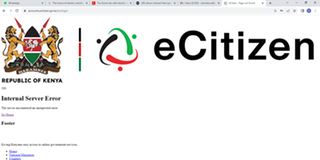
A screenshot of the eCitizen platform. ICT Cabinet Secretary Eliud Owalo has revealed that the downtime being experienced on the eCitizen portal has been caused by hackers attempting to jam the portal. PHOTO | POOL
The government has raked in at least Sh127.2 billion through e-Citizen digital platform since President William Ruto ordered that all government services be paid through a single paybill number.
National Treasury Cabinet Secretary John Mbadi said the platform processes about 120,000 transactions daily and was able to collect Sh26.4 billion in the financial year ended June 30, 2023.
The figure, however, exponentially grew to Sh100.8 billion in the fiscal year ending June 30, 2024 when more services were on-boarded into the system, currently at 16,000 services.
“We have managed to reduce leakages in the system. Having a single paybill has worked well and visibility of our transactions has been enhanced. The platform has managed to stop leakages,” said Mr Mbadi while appearing before the Senate on Wednesday.
The CS said that Social Health Insurance Fund (SHIF) payments will soon be on-boarded into the digital payment platform as part of government’s policy to have all services through the system with high-level engagements towards the same already underway.
The development is part of the Kenya Kwanza’s move to digitise all government payments in order to increase revenue collection, minimise the cost of collection and enhance service delivery.
Mr Mbadi was responding to a question by Nairobi Senator Edwin Sifuna who wanted to know where the convenience fee charged and all other payments that fail to reflect on the platform end up.
The senator further wanted to know what has occasioned the failure of the e-Citizen digital platform to process and reflect payments made to some institutions such as the National Health Insurance Fund (NHIF) as well as steps taken to remedy the situation.
This is in addition to the safety, efficiency, efficacy and reliability of the digital payment platform, in light of the numerous complaints of delays and technical issues that followed the onboarding of a significant number of government services on the platform.
“What is the justification for the convenience fee? It means you are paying for a service and also still being charged for it. For example, if you are remitting your monthly premium for NHIF, what is the justification for that fee?” posed the ODM secretary-general.
In defense, the CS said the convenience fee is paid to the service provider who has ensured government services are easily accessible online and payments can be done electronically and conveniently.
He explained that the platform charges between Sh5 and Sh50 as convenience fee depending on transaction amount while for dollar accounts, the charge is a dollar.
The CS pointed out that the platform only collects convenience fees for successful transactions and when a user makes a payment, it will be collected first by the service providers’ channels before the money is channeled to the e-Citizen account at Kenya Commercial Bank.
“The convenience fee is collected by the e-Citizen platform and remitted to the e-Citizen settlement account domiciled at the National Treasury. The convenience fee goes to the service provider so that money collected is not again be used to pay the service provider,” said Mr Mbadi.
He noted that the payments are made in designated and defined format in the system which must be followed for it to succeed. Any payment that does not conform to the format will not be successful, he explained.
However, should the payment fail, he said the transaction details, that is, payment amounts and convenience fees, are retained by payment service providers which reverse the transaction and the e-Citizen platform is notified.
Major challenges
The CS admitted that the system has faced major challenges during the on-boarding of over 16,000 services from the previous 397 such as cyberterrorism and hacking.
Nonetheless, he said there is a multi-ministerial team with security operation centres that monitors the platform and ensures any attack is responded to immediately to ensure it is secure against cyberterrorism, hacking and compromises which are likely to disrupt the provision of services.
“The platform has withstood several cyberattack attempts made by hackers with efforts arising from continuous platform vulnerability risks assessment. The team has been able to address significant portions of the challenges to stabilise the platform,” he said.
Narok Senator Ledama Olekina pressed the CS whether the government has control of the platform or it is going to be leased forever or will be transferred to the government at some point.
“Was the system developed on a build-operate-transfer (BoT) model or will it be leased forever? At what point is the government going to have full control of the system from the Webmaster?” posed Mr Olekina.
CS Mbadi said the system has been handed over to the government and is being operated under contractual terms by the ICT Authority where the government collects money and the Authority then pays the service provider.
“The contract is for three years after which the government will evaluate whether to continue with it or seek another system,” said Mr Mbadi.
Nominated Senator Esther Okenyuri asked the minister why hospitals are still owed money by the defunct NHIF yet people had been deducted the money through their contributions and how much is the debt.
Nominated Senator Catherine Mumma wanted to know whether mechanisms have been put in place to conduct an audit of NHIF in order to account for funds put in the entity by Kenyans.
“People who pre-paid for health insurance at the start of the year are now being told they cannot use NHIF cards. How has this been transitioned and is a special audit being carried out on NHIF to ensure accountability for every cent Kenyans have put in the entity?” she posed.
Mr Mbadi admitted that no audit has been conducted but he said the exercise will be done to ensure closure.







